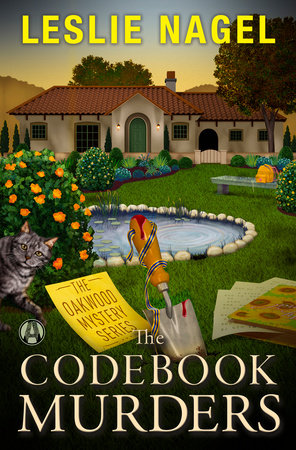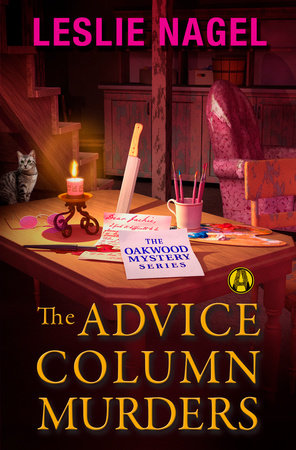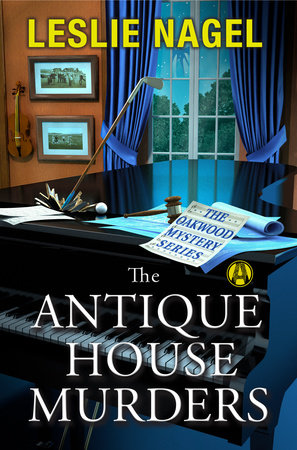Excerpt
The Book Club Murders
Chapter 1
This day was stomping on her last nerve, and it wasn’t even ten o’clock.
Charley Carpenter drummed her fingers on the wheel of her battered orange VW Beetle, keeping time to the radio in a vain attempt to distract herself from how late she was running. She figured it must be a universal law, how things only went wrong on days you were most in need of a smooth getaway. Dead hair dryer, ripped nylons, missing car keys, her father—
No. Spending time with her beloved dad was never a burden. The tense line of her jaw eased a fraction. Not ever.
She glanced at the Little Mermaid clock she’d duct-taped to the dash. The radio in this antique worked, but the clock had given up the ghost long ago. She checked her mirrors and the side streets up ahead, searching for light bars or shield-shaped emblems, wondering if she could risk a little more speed. Oakwood cops loved to set up shop along this stretch of Shroyer Road, where the speed limit dropped abruptly just this side of the Dayton city line. The last thing she could afford right now was a ticket.
How peculiar. Not a single squad car in sight. Maybe the hot-donut light was on, she thought, and she almost smiled. It wasn’t like the cops in this one-horse town had much else to keep themselves busy. Besides, it was about time she caught a break.
Charley depressed the accelerator, determined to catch the yellow light at Patterson Road. She downshifted and took the left hard, just making the light, her tires squealing in protest. She worked the wheel, straightening the car out of a modest fishtail skid, feeling like Danica Patrick, her mood lifting. Time to take charge of this stupid day. She could make up the time, she was flying now, she would—
“Crap!”
Charley stood on her brakes, the little car shuddering to a stop. Ahead of her loomed a solid wall of flashing red and blue. Patterson was completely blocked with police cars. In fact, it appeared Oakwood’s entire Safety Department had relocated to this one spot. No wonder there was no one back there netting speeders. They were all here, doing . . . what?
She noted Oakwood’s lone ambulance, as well as the gleaming red hook-and-ladder truck and the pump engine. Had there been a fire? An accident? The vehicles were positioned above the old train tracks, on what was essentially a bridge. The abandoned tracks twenty feet below had been blacktopped to create a makeshift trail. Kids had been hanging out under this bridge, writing graffiti, smoking, and partying, since the last train rolled through in the seventies. Had someone fallen down there?
Charley peered through the windshield. She couldn’t see a wrecked car. There were no victims wrapped in blankets, huddled against the November chill. There was no one giving a statement, no one doing much of anything. It hardly looked like an emergency, in fact, despite the show of force. She did see about a dozen people, most in uniform, standing around. Some spoke into lapel radios, others chatted quietly among themselves.
An officer spotted Charley’s car and began walking toward her. He waved a hand in a high circle, indicating she should turn around. Just beyond him she could see a white van pulling up from the opposite direction. The words “Montgomery County Coroner” were painted in large black letters on the side. The coroner?
As the crowd made way for the van, Charley caught sight of another car. She stiffened. A dark blue Ford, unmarked but still screaming “official vehicle,” was parked at an angle across the road. It was a car she recognized.
Jamming the gearshift into reverse, Charley punched the accelerator and hauled the wheel hard right. The cop scrambled out of her way as she shifted again, hauled left, and lurched forward, heading back the way she’d come. She ignored the angry shout, guessing rightly that he wouldn’t bother to pursue. Right now those guys had bigger fish to fry than a questionable case of reckless operation.
As much as Charley didn’t want a ticket, she wanted a confrontation with the owner of that sedan even less.
Five minutes later she turned onto a charming side street, home of the Shops of Park Avenue. This optimistically named, microscopic center of commerce nestled comfortably within an otherwise residential community. She maneuvered down an immaculate concrete alley and parked in her reserved space. The tiny sign—Owner: Old Hat Vintage Fashions—never failed to deliver a thrill of pride.
Charley grabbed her bag and wrenched open the car door, unfolding her long legs from the cramped interior. She forced it closed again, her effort producing a protesting screech of metal on metal.
She dashed up the alley and ducked into a tiny bakery that shared a small, converted frame house with her favorite hair salon. The clock was ticking, so she grabbed the first thing she set eyes on: two dozen sand tart cookies. Probably not fancy enough for Midge Crawford’s elegant buffet table, but they would have to do. Charley was almost always assigned dessert, or bread, occasionally wine—anything that required minimal culinary effort or expertise. She was the only unmarried member of the group, and the others treated her single status like a disability that had to be accommodated. Fine by her.
She exited the bakery, took two steps to the right, and, with a sense of having crossed a finish line, pulled open the brushed-steel door of Slash.
The smell of citrus drew her in. Surfaces gleamed. From the stereo behind the reception desk, soft jazz soothed her jangled nerves. Two college-aged girls sat in the waiting area, flipping through fashion magazines and pretending they weren’t checking out Dmitri’s spectacular leather-clad ass.
The owner of said ass, Slash’s top stylist and Charley’s second-best friend on earth, beckoned her to his station. Large, liquid brown eyes surveyed her critically. Dmitri St. James ran his hand through silken, shoulder-length black hair that framed a face chiseled by the angels. “Good night, Charley. Did you brush that mane with a power tool?”
“Bite me. I’ve had the morning from hell. Besides, I count on you to prep me for the Agathas.” Charley surveyed her wild red curls with resignation. It did look a little like someone had been at them with a clawhammer.
“Ah, yes. The bloodthirsty Murder of the Month Gang, where poor grooming is grounds for expulsion.”
Charley laughed and kissed his cheek. “They’re not all out for blood.”
“I’ve seen them in action, cupcake, and that bunch are all in touch with their inner predators. I don’t know why you don’t ditch those bitches. Look at you. You’re a bundle of nerves every month on meeting day.”
“You know why. Hanging out with Oakwood’s rich and famous is extremely good for business. Besides, I love the books and solving mysteries.” Charley grinned. “And I’m pretty sure Frankie would kill me if I quit and left her to fend for herself.”
Dmitri settled Charley into his stylist’s chair, snapped on a whimsical plastic poncho printed with hot pink lightning bolts, and started massaging mousse into her hair. She sighed with pleasure.
“You’re cutting it close, sweetie. I expected you twenty minutes ago.”
“I ran into a . . . I’m not sure exactly what it was.” She described the scene, leaving out the unmarked Ford.
“Car accident?” Dmitri began a complex series of twists along her hairline, securing them with tiny copper hairpins.
Charley frowned. “I didn’t see a wreck, but the meat wagon means a dead body.”
A familiar voice chimed in. “Not just any dead body. A murdered one.”
They turned to see Francesca Maria Angelica Cartolano Bright standing in the doorway, Charley’s oldest and best friend, all ninety-nine pounds of her vibrating with tension. Frankie brandished her cellphone, blue eyes huge in her pixie face. She caught sight of Charley and frowned.
“You’re not ready yet?”
“Working on it,” Dmitri muttered.
“Murder?” Charley prompted. “Who says it’s murder?”
“Just got a text from Jelly. She’s already at Midge’s, and everyone’s talking about it.” “What a shock,” Charley deadpanned. “Jelly got the scoop before anyone else.” Jelly Markes’s husband was the manager of a local TV station, a match made in heaven for one of the most voracious gossips in town.
Frankie waggled her phone. “You know that trail under Patterson, where the stoners hang out? Some guy was jogging down there this morning, and he saw—he found—a dead woman.”
“Charley, you were practically touching a corpse.” Dmitri shivered.
“The street is completely closed off. Police, fire trucks, an ambulance—like, what do they need that for, but still—reporters, photographers, all the local TV talent.”
“Does anyone know who she is?” It couldn’t possibly be anyone they knew, Charley thought. A homeless person, maybe a drug deal gone bad?
She recalled the sedan she’d seen. Marcus Trenault had been at that crime scene, probably down on the trail with the . . . body. Of course the big-shot police detective would be involved in a case of this magnitude. A murder in Oakwood. Unbelievable.
Frankie plopped into the chair next to Charley’s and started primping in the mirror, fluffing out an enormous mass of springing brown curls with her fingers. “Jelly says the police aren’t releasing any details to the media. It’s ‘an ongoing investigation.’ Can you believe it? Just like in Book Club. Tragic, but a little exciting, too, don’t you think?”
“Depends on who bought it,” Dmitri said darkly.
“‘Bought it’? Who are you, Sam Spade?” Charley shook her head. “No doubt about it, this will be the talk of Book Club today. Whoever’s presenting will get off easy.”
Frankie smirked. “It’s Jelly. You’re right: She’ll milk this for all it’s worth.”
Dmitri removed the poncho with a flourish. “You are officially dressed to kill.” Charley made a face. “You did not just say that.”
“Crap.” Frankie glanced at her watch before giving her brown mop a final pat. “Now I’m late, and I’ve got the wine, plus I’m giving Lindy Taylor a ride. . . . Get the lead out, Carpenter.” She flung this last command over her shoulder as she blew out the door. It felt like six or seven people had just left.
Dmitri helped Charley with her coat before pulling her in for a hug. “I suppose it was only a matter of time before violent crime landed in Oakwood.”
She clung to him, reveling in his strength, somehow needing that security, if only for a moment. She stepped back with a sigh. “It hasn’t landed yet.” She checked the wall clock as she retrieved her humble bakery bag, resigned to the anticipated frowns of disapproval. “I’m sure the victim will turn out to be a total stranger.”
Detective Marcus Trenault stood over the body. It had been arranged carefully on a stained, discarded mattress. The mattress, in turn, had been positioned with equal care in the precise center of a cracked asphalt trail, on the threshold of a concrete storm culvert. Dripping with moisture and just under seven feet high, the culvert opening was barely tall enough to allow Marc to stand. The smell of decomposing garbage and stagnant water oozed from the damp walls like foul breath from a monstrous, gaping mouth.
There were no obvious wounds other than a small gash on the left temple. Not deep enough to kill, Marc estimated, but a blow to the head severe enough to leave that gash might be enough to incapacitate. The crime scene techs would need to search the area for anything that might have caused that wound.
At some point the head had been encased in a black garbage bag, which in turn had been secured around the corpse’s neck by a brown leather belt. Presumably, the murderer had done this. An overzealous and inexperienced young safety officer had torn the bag away and attempted CPR. Marc tried not to think about the potential loss of evidence.
He tried not to think about anything except the dead woman before him. Twenty feet above his head, he could hear the muffled rumble of official radio traffic, words indistinct at this distance. All of it—the crumbling trail, the graffiti-covered retaining walls, the trash, the smell of urine and stale beer, the identity of his victim—everything seemed tinged with unreality.
Odd, he thought, how the kudzu, honeysuckle, and junk trees remained thick and green down in this humid microclimate, screening the trail from casual observers despite the fact that it was mid-November. He wondered if the murderer had deliberately chosen the most desolate, putrid setting available for the staging of this cruel tableau.
Because this scene had been staged. Marc was certain of it.
Just this morning he’d been lamenting the boredom of his small-town routine, the humdrum round of lost dogs, stolen bicycles, and petty vandalism that made up the crime beat in upscale suburbia. In a moment of supreme arrogance, he’d actually wished for a nice, juicy murder case.
Moral: Be careful what you wish for.
“You know her?” Detective Paul Brixton spoke quietly. He stood, short legs spread wide, arms folded across a barrel chest, hooded dark eyes set deep within a surprisingly serene, unlined face. His stiff black hair stuck up like Alfalfa’s from Our Gang. He’d hung back in acknowledgment that Marc was primary on this case.
Marc had a lot of respect for Paul, a twenty-four-year veteran who’d been with the Oakwood Safety Department for over a decade. Marc, on the other hand, had dropped out of law school just over ten years ago to become a cop. Until recently, he’d been a rising star within Chicago PD’s Homicide Division. His ascension through the ranks had been swift and sure, including two years with Vice and a stint with the Organized Crime Task Force. Plenty of toe tags to go around at that party. The truth was, despite Paul’s seniority, Marc had far more experience with dead bodies.
“I know her.” Marc straightened. “Her name is Serena Wyndham. We went to high school together.”
“I’m sorry, son.”
“We’ll start with next of kin.” Marc turned his back on the corpse as two coroner’s orderlies muscled a stretcher over the guardrail and started down the muddy slope to the trail. “Serena’s separated from her husband. Was separated. He’s an asswipe anyway, so we’ll track down her sister first. Her name is Lindy Taylor.”







